solar power
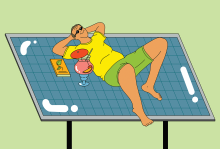
WE RECENTLY SPENT a couple hours with a salesman who was promoting the advantages of installing a passive solar system.
He had me at passive.
He also mentioned the federal incentives and tax breaks, but it was the promise of passivity that would have made me jump for joy, had I believed in that level of exertion.
Passive is right up my alley. I love anything that you can do from a seated position. My oven is self-cleaning, I wear no-iron shirts, my refrigerator defrosts itself, sometimes even while I’m in the same room, seated. Those unexpected dripping noises remind me it’s working hard even when I’m not, unless the day’s Wordle is frustratingly difficult.
Not to mention the satisfaction of having skilled workers around the house, role models in an honest day’s work by able-bodied — albeit excessively tattooed — men that are otherwise missing from my home.
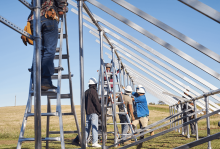
IN 1876, LAKOTA SIOUX rode on horseback from South Dakota to Montana Territory to help the Northern Cheyenne at the Battle of the Little Bighorn in one of the most important actions of the Great Sioux War.
The battle was inevitable. The rights promised through the Second Treaty of Fort Laramie, which gave the Sioux and Arapaho possession of the Dakota Territory, were being ignored. White miners had come to settle on part of the land that was sacred to the Lakota Sioux. The U.S. government ordered the Indigenous communities to return to their designated reservations. Instead of complying, they banded together as an act of resistance. Led by Lakota Sioux Chief Sitting Bull, the Indigenous resistance grew several thousand in number and ultimately defeated Lt. Colonel George Custer and the 7th Calvary—one of the worst U.S. army defeats during the Plains Wars.
Nearly 150 years later, members of the Sioux and Northern Cheyenne have joined forces once again to defend themselves against a new threat to their communal life: fossil fuels.

Lost in much of the promotional hype leading up to Solar Power was the quiet news that in the interim between her previous album and her latest, Lorde had started therapy. Famously private, she didn’t share much more than that, but she doesn’t need to — and anyway, the new sonic landscape of the album speaks for itself. Whereas the propulsive and explosive beats of Melodrama mirrored the rhythm of thoughts racing out of your control, the bubbly basslines of Solar Power reflect the steady progression of growth she’s experienced in the years since.
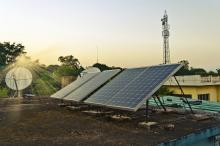
ONE OF THE most destabilizing facts of the last five years is this: The price of a solar panel has fallen 75 percent. The engineers have done their job, and that offers many possibilities.
We usually look at what the developed countries are doing with renewable energy, such as the fact that there were days during summer 2014 when Germany was generating three quarters of its power from solar panels (Germany!). But the most amazing miracles—and it doesn’t really stretch the word “miracle”—are happening in the poorest places, where for the very first time lights are blazing on.
Take rural Bangladesh, where fossil fuel has barely penetrated in the 200 years of its ascendancy in the West. There’s no grid—at night it just goes dark. Until the last few years, when low-cost solar panels and innovative financing arranged by groups such as the Grameen Bank have allowed the very rapid spread of solar panels. How rapid? As many as 80,000 new connections a month, which is far more than in the United States. Fifteen million Bangladeshis live in solar-powered houses already, and the government is hoping to have the entire nation hooked up by 2020.
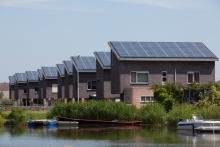
EARLIER THIS YEAR, 14 solar panels were installed on my roof. Each day since—in fact, multiple times a day—I've eagerly checked our online meters, as the sun replaces coal and nuclear plants as the provider of my home's electrical needs.
I've waited a long time for this. I attended my first energy conference in the late 1970s, when I joined several other students from the hunger action group at our Jesuit college, Seattle U., for the 20-hour van ride to Denver—even then, the connection between poverty and energy issues was clear.
That conference was one of several conducted by the U.S. Catholic bishops to gather input for what became a major and still-relevant document published in 1981 under the unassuming name "Reflections on the Energy Crisis." The statement noted that "solar power can help open the way to permanent energy security, pointing beyond the end of fossil fuels."
So last summer I was thrilled to sign a contract with a company called SolarCity, which installed the solar panels on my rooftop under a lease arrangement—they own the panels, and I buy solar power from them whenever the sun shines. And there's sure a lot of sunshine to tap: Every hour of daylight on earth, the sun releases the amount of energy consumed by the entire population of the planet in one year.
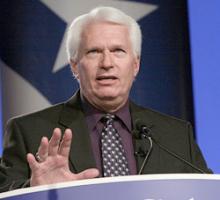
DIVINING GOD'S intent is incredibly easy—all you have to do is seek out his representatives here on earth, like Bryan Fischer, director of "issue analysis" for the American Family Association, "where he provides expertise on a range of public policy issues."
Indeed, Rev. Fischer speaks for the Lord on any number of topics (badness of gay people getting married, badness of Barack Obama who nurtures a "hatred of the white man," badness pretty much of anything that's changed since Fischer was born in 1951). But in the autumn, he offered the authoritative assurance that there was one thing God thought was really, really good: fossil fuel.
Fischer said that not using all the coal and gas and oil we could find was an affront to God—it would hurt God's feelings. In fact, he offered an analogy: Once "I opened up a birthday present that I didn't like, and I said it right out, 'Oh, I don't like those,'" he explained. "And the person that gave me the gift was there. And it just crushed that person. And you think, that's kind of how we're treating God when he's given us these gifts of abundant and inexpensive and effective fuel sources," Fischer added. "And we don't thank him for it and we don't use it. ... You know, God has buried those treasures there because he loves to see us find them."
That's really top-notch theology, as other similar top-notch theologians would attest. Dr. Calvin Beisner, for instance, is a founder of the Cornwall Alliance, the premier faith-based climate-change-denial operation on the planet. Sharing the microphone with Rev. Fischer, Rev. Beisner pointed out that not burning fossil fuel is really "an insult to God"—and that Jesus, too, wants us burning coal. If we didn't take advantage of all the flammable rocks on the planet, Beisner said, we would be like the "wicked and lazy steward" who was given talents by his master but simply buried them.